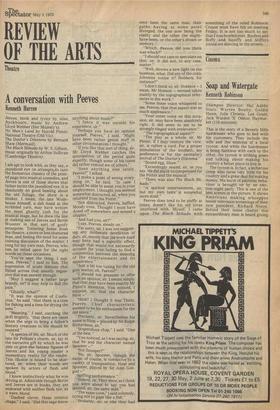REVIEW OF THE ARTS
Theatre
A conversation with Peeves
Kenneth Rum
Jeeves, book and lyrics by Alan,_ Ayckbourn, music by Andrew Lloyd Webber (Her Majesty's) No Man's Land by Harold Pinter; National Theatre (Old Vic) The Doctor's Dilemma by Bernard Shaw (Mermaid) The Black Mikado by W. S. Gilbert, music originally by Arthur Sullivan (Cambridge Theatre) I am apt to look with, as they say, a jaundiced eye on attempts,to turn the humorous classics of the print ed page into musical comedies, and Jeeves is one of those shows that rather invite the jaundiced eye. It is absolutely no good beating about the old foliage, the show is a stinker. I mean, the .late Wode house himself, a dab hand at the scribbled yarn, may have written the most ghastly tosh for the musical stage, but he drew the line at making use of Jeeves and Bertie Wooster in that sort of goofy enterprise. Tottering home from the theatre, a more or less shattered man, and feeling the need for some calming discussion of the matter, I rang for my own man, Peeves, who can be relied upon for the right words on these occasions.
"You've seen the thing, I suppose, Peeves," I said to him. The expression of acute distaste that flitted across that usually impassive dial was answer enough.
"May I suggest a rather large brandy, sir? It may help to dull the pain."
"Ghastly, what?"
"It was the opinion of Confucius," he said, "that there is a time for fishing and a time for drying the nets."
"Meaning," I said, catching the drift brightly, "that there are times when the urge to bring a fellow's literary creations to life should be resisted."
"A species of life, sir. Much of the late Sir Pelham's charm, sir, lay in the narrative gift by which he was able to give the fantasy figures of Jeeves and his young master a momentary reality for the reader. This illusion is bound to be shattered, sir, when their words are spoken by actors of flesh and blood."
I knew instinctively what he was driving at. Admirable though Bertie and Jeeves are in books, they are endowed with neither flesh nor, as it were, blood.
"Dashed clever, these oriental chaps," I said. "Did this sage know anything about music?" "I fancy it was outside his experience, sir." "Perhaps you have an opinion yourself, Peeves," I said. "Might have been rather genial stuff in other circumstances I thought."
"If you like that sort of thing, sir. Mr Lloyd Webber catches the syncopation of the period quite expertly, though some of his tunes did rather remind me of others."
"Seen anything else lately, Peeves?" I asked.
"I make a point of seeing everything sir," he said. "In case I should be able to assist you in your employment. I thought you seemed somewhat distracted, sir, when you returned from the Pinter."
"Not distracted, Peeves, baffled. Moody even. Thought I must have dozed off somewhere and missed a chapter."
"And had you, sir?"
"I say, Peeves, steady on."
"I'm sorry, sir. I was not suggesting any deliberate dereliction of duty, sir, merely that the work itself may have had a soporific effect, though that would not neeessarily account for your failing to find a conjunction between the meaning of the entertainment and its appearance."
"Just a bit too taxing for the old grey matter, eh, Peeves?"
"I should not presume to offer such an opinion, sir. I meant simply that that may have been exactly Mr Pinter's intention. You noticed, I suppose, sir, that the character Hirst —"
"Hirst? I thought it was Thirst, Peeves. Chief characteristic seemed to be his enthusiasm for the old sauce."
"Precisely, sir. Nevertheless his name is Hirst — played by Sir Ralph Richardson, sir."
"Stupendous chap," I said. "One of the best."
"You noticed, as I was saying, sir, that he and the character named Spooner "Not Snooper?" "No, sir, Spooner, though the name, of course, is conducive to a variety of transposition. Hirst and Spooner, played by Sir John Gielgud —" 'Spiffing performance." "Indeed, sir. They were, as I think you were about to say you had divined, sir, the same man."
"The same cove," I said solemnly, trying not to gape like a fish." "Probably, sir, or else they had once been the same man, their paths having at some point diverged, the one now being the reality and the other the mighthave-been, or the other's dream or memory."
"Which, Peeves, did you think was which?"
"I should not care to speculate on that, sir. It did not, in any case, matter."
"Well, throws a new light on the business, what. Did any of the critic Johnnies notice it? Hobbers, for instance?"
"I don't think so, sir. Hobbers — I mean, Mr Hobson — seemed taken mainly by the topographical references in the work."
"Some inner voice whispered to me, Peeves, that that aspect was so much applesauce."
"Your inner voice on this occasion, sir, may have been absolutely right. It did seem to me to be strongly tinged with irrelevance."
"The topographical aspect?" "The play as a whole, sir. Mr Pinter, if I may venture the view, sir, is rather a card. For a proper stimulation of the intellect, my preference is for the exemplary revival of The Doctor's Dilemma."
"Sound egg, Shaw."
"Exceedingly sound, sir, as you say. He did much to compensate for the Pinter and the musical."
"There was also The Black Mikado."
"A spirited entertainment, sir, but my own tasteis somewhat more staid."
Peeves does tend to be stuffy at times; doesn't like his old loves interfered with. Myself, I came upon The Black Mikado with
something of the relief Robinson Crusoe must have felt on meeting Friday. It is not too much to say that I was bowled over. Boofers and Boffy and Squiffy and Stiffers joined me dancing in the streets.


































 Previous page
Previous page